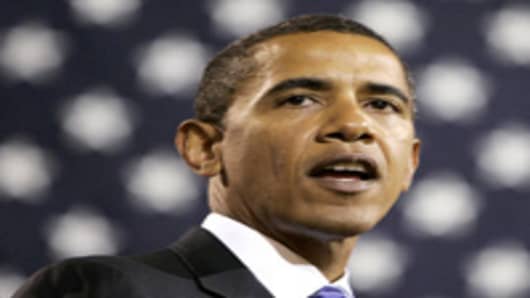"There were a lot of independents and Republicans who support Senator Obama who had to switch their registration for Tuesday's primary," said Sarah Posner, 21, the group's leader.
Pennsylvania is the next battleground for Clinton and Obama in their contest for the right to face Republican John McCain in the November election.
The Center for Information & Research on Civic Learning & Engagement, or CIRCLE, which has tracked youth voting since the U.S.
voting age was lowered to 18 in 1972, says this year has seen the highest national registration rate in history among those under 30.
Youth turnout in some state primaries this year tripled or even quadrupled over the previous presidential election, said CIRCLE Director Peter Levine.
No Lobbyists, Better U.S.
Polls before Tuesday's Pennsylvania primary show Obama, an Illinois senator, has chipped away at Clinton's once double-digit lead.
A Zogby poll issued on Friday showed Clinton, 61, a New York senator, led among Democratic voters older than 54. Obama, 46, led among young voters. Polls close in the state at 8 p.m.
Pennsylvania, with 15.6 percent of its citizens over 65, is second only to retirement retreat Florida in the percentage of residents who are elderly.
Among registered Democratic voters, 26 percent are under 34 and 38 percent are older than 55.
Posner said she embraced Obama for "a million reasons," including his opposition to the Iraq war, his willingness to conduct diplomacy with enemy states Bush has scorned and his refusal to take donations from lobbyists.
Chris Young, a 2008 college graduate who covers Pittsburgh for the alternative City Paper, describes "this kind of energy surrounding Obama and the race in general."
"I hate to harp on that idea of 'hope' but it's true, and I have the sense of hope with somebody like him, somebody who seems like he can bring he country together," he said.
Duquesne University senior Alexandra Nseir, 23, switched registration to Democrat from independent and then swapped candidates after watching the primaries unfold.
"Initially I thought I was really going to support Hillary but I slowly changed because she's just so divisive and I didn't like her tactics," she said in a campus interview.
"Just by electing him, I think America's image will improve," added Nseir.
Translating Enthusiasm into Votes
In every presidential election since 1972, turnout by citizens under 30 in Pennsylvania was slightly below the national average for young voters and lagged behind that of older voters.
In 2004, 47 percent of young Pennsylvanians, and 68 percent of those over 30, went to to the polls, according to CIRCLE.
University of Pittsburgh political scientist Stuart Schulman, an organizer for Obama, said experience all that youthful interest did not always translate into actual votes.
When he launched his neighborhood Obama group, the first 16 volunteers were all women over 40 with campaign experience.
Young voters "may be all charged up, they may be on MySpace, Facebook, text message alerts ... but they won't knock on a door to save their lives," Schulman said.
CIRCLE's Levine says support for Obama, who would be the first black U.S. president, "may be so large that it can explain the increase (in voter registration), but it's not the case that they're all voting for Obama."
A tour of Pittsburgh's hip south side turned up people who wish populist John Edwards had not dropped out of the Democratic primary, and passionate support for Republican candidate Ron Paul, the libertarian-leaning Texas congressman.
Carnegie Mellon University chemistry student Rachel Ehrlich, 19, got up at dawn last week to be near the front of the line for Republican Sen. John McCain's campus appearance.
"I don't think that rhetoric on hope and change is what we need. We need answers and I think he's got them," she said.


